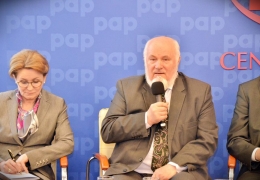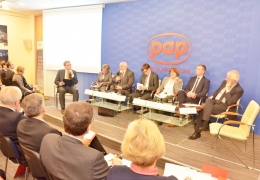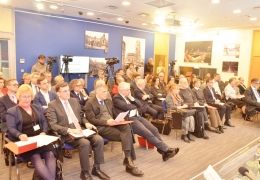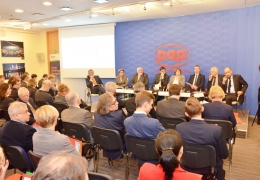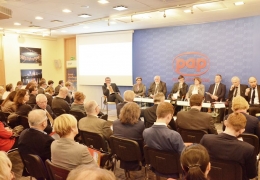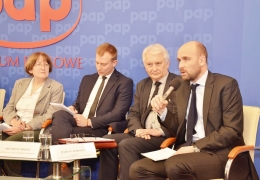On February 25th, 2016 in Polska Agencja Prasowa (Polish Press Agency) in Warsaw took place a debate entitled: "Assumptions for amending the ETS directive – can the packeting of discussions on the ETS and non-ETS sectors be an effective method of optimizing the Polish path to CO2 emission reduction?"
The objectives of the debate were climate and energy policy until 2030 were set out by the European Council on 24 October 2014 and include: GHG emissions reduction by 40% compared to 1990 (ETS installations: 43%, non-ETS installations: 30% in relation to 2005); RES share target of 27%, and energy efficiency improvement by 27%. Compensatory mechanisms for countries with less rapid development have been envisaged. They include the possibility of free-of-charge allocation of emission allowances to electricity producers under the EU ETS (the so-called CO2 derogations), within the national pools of allowances to be sold through auctioning; and the Modernization Fund consisting of funds from the sale of the reserve of allowances, equivalent to 2% of the overall pool of the EU allowances in the period 2021-2030.”
The works on implementing documents for the climate and energy policy until 2030 are underway. The European Commission intends to present for public consultations, in February 2016, proposals of implementing the findings of the Paris Conference COP21. Their impact on the Polish economy and the maintenance of its competitiveness depends on specific solutions to be adopted; therefore, Poland should strive for its position to be taken into account. According to Prime Minister Beata Szydło, “we intend to meet the climate protection obligations, but we also want the Polish economy to develop (...) It is about the possibility of peaceful development of the economy, and creating conditions for Polish enterprises to be able to compete”.
Poland does not agree with the too ambitious policy and submits to the European Court of Justice a complaint regarding the earlier implementation of the Market Stability Reserve (MSR), approved by the European Parliament and the European Council; instead of 2021, the reserve would be implemented in 2019.
The discussions during the debate focused on issues relating to the optimization of the Polish path to the CO2 emissions reduction, including:
- Optimization of CO2 emissions reduction in the whole economy (in the ETS sectors and non-ETS sectors), taking into account the EU target and possible costs to be incurred by the Polish economy,
- The impact of the proposed changes on carbon leakage,
- The costs of CO2 emissions reduction in the electricity and heat production sectors,
- The possibility of using the derogation; the impact on electricity prices and development of investment projects,
- The planned operation and management of the Modernization Fund,
- Is it possible to jointly discuss and “packet” the arrangements for the ETS sectors and non-ETS sectors, and can this contribute to the maintenance of the competitiveness of the Polish economy?
Strategic Partners
![]()
![]()




![]()

![]()
![]()

